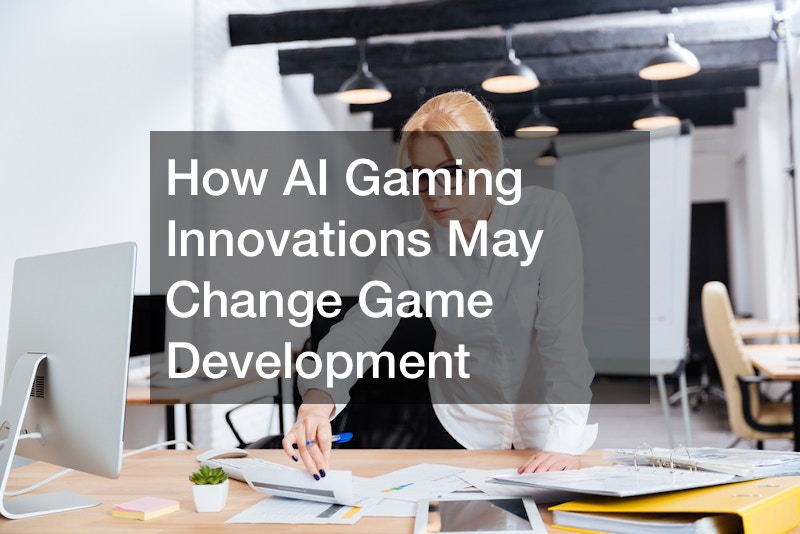Have you ever imagined a world where game developers could create endless virtual worlds in the blink of an eye? Where can the tedious and time-consuming process of developing and designing in-game assets be completed in minutes? This is not a far-off fantasy but a potential reality that could be made possible with AI gaming technology. In recent years, AI tools have been rapidly evolving, and it’s no secret that the gaming industry is one of the key sectors set to benefit from these advancements. From training employees to generating in-game assets, the integration of AI in game development can evolve the industry as we know it. However, this transformation has its challenges, and in this article, we’ll look at the potential benefits and obstacles of AI in game development.
In the highly competitive world of game development, time and efficiency are essential. AI in gaming technology paves the way for developers to push out products faster while generating more detailed in-game assets. From procedural generation to machine learning, AI transforms our thinking about game development. This article will explore some of the most significant AI gaming innovations and how they are changing the gaming industry’s future.
AI Is Changing the Way Businesses Operate
AI is changing how businesses operate on many levels, from supply chain management to customer service. However, one area that is often overlooked is the impact of AI on digital communications. With the advent of AI-powered chatbots, businesses can automate their customer service and support functions, freeing employees to focus more on revenue-generating tasks.
Digital communications also play a crucial role in the development of games and the interaction between gamers. AI-powered chatbots can be used to provide assistance to players, guide them through the game, and even offer personalized in-game experiences. This creates a more engaging and interactive gameplay experience, making gamers feel more connected to the game and the community. These AI gaming innovations make for occasions that would be unobtainable by gamers in the past.
Another way in which AI is changing digital communications within the gaming industry is through the use of sentiment analysis. With the help of natural language processing algorithms, businesses can analyze customer feedback, reviews, and social media posts to gather insights into customer sentiment. This helps game developers to identify any issues with the game and address them quickly, leading to higher customer satisfaction and retention rates. Ai communications are assisting businesses in the gaming industry with digital communications that exceed what large-scale companies have been capable of in the past.
AI May Level the Playing Field Between Startups and Established Businesses
In the past, startup game studios faced significant challenges competing with established game studios. The cost of developing a game and the need for more resources made it difficult for new studios to enter the industry. However, AI is leveling the playing field between new startups and established game studios. AI gaming innovations are helping startups genuinely compete.
One of the ways in which AI is helping startups is by enabling them to work in coworking spaces on just a few machines. AI-powered tools allow small teams of developers to create entire virtual worlds and rapidly prototype new game mechanics in a fraction of the time it would take with traditional development methods. This means that startups can get a product to market faster and with a lower overhead cost, providing them a competitive advantage against larger game development companies.
Another significant advantage that AI provides to startups is the ability to scale development quickly. AI-generated results can provide valuable insights to help game developers make decisions and improve game mechanics, leading to more efficient development processes and streamlined work procedures. AI algorithms can also identify issues with the game, increasing the speed at which fixes can be implemented and ultimately leading to a higher-quality product.

AI Can Be Used for Game Marketing
AI-generated content is transforming the way gaming developers approach their digital marketing efforts. With the rise of affordable digital advertising, gaming studios are searching for AI-powered tools to help them grow their business while working within their marketing budget. AI-assisted marketing can help these studios to sort through the vast amounts of marketing data easily and quickly, leading to high-converting content that allows them to remain competitive in the industry.
One of the significant benefits of using AI-generated content is the ability to produce personalized content at scale. Through machine learning algorithms, marketers can quickly analyze millions of data points, including demographics, interests, and behavior, to identify what each customer is looking for and develop highly-targeted ads for each segment. This results in more effective ad campaigns that deliver relevant content to each audience, ultimately leading to higher conversions and ROI.
AI gaming innovations can also help developers optimize ad campaigns through A/B testing and performance analysis. This allows game studios to test and compare different ad copies, visuals, and call-to-actions, identifying the best-performing ads in real-time. Machine learning algorithms can optimize ad delivery by adjusting bids and placements for maximum conversions based on collected data.
Moreover, AI-generated content has the potential to free up human resources, allowing marketing departments to focus on more creative tasks, such as developing marketing strategies and improving customer engagement. This helps game studios foster more innovation in their marketing campaigns and develop more successful ones.
The Role of AI Art in Game Design
AI art generation has rapidly emerged to become a crucial component in game design, offering game developers vast capabilities to create a myriad of game assets with less time, cost, and effort. One of the ways AI is transforming game art is by creating fast decals for background items, logos, and branding elements. These are genuine AI gaming innovations.
With the help of AI-powered tools, game artists can easily create designs for repeated wall textures, foliage, ground surfaces, and other background items, quickly generating these high-quality textures without losing resolution or visual integrity. AI-driven designs also enable game developers to focus more on the fundamental game design and storyline rather than spending countless hours detailing the game’s graphics.
Moreover, AI-powered predictive modeling has demonstrated a significant impact in producing 3D game art, reducing the development time required to create models and animations, one render at a time. AI-enabled algorithms are trained to develop graphics, reduce the time spent in 3D modeling game assets, and help yield quicker, automated development of assets. This feature significantly reduces the time between the design phase and the launching of a finished product, enabling game designers to make quick and accurate adjustments without manual intervention, thus leading to more efficient development cycles.

How AI Can Help Developers Estimate Launch Dates
The role of big data analytics and AI is proving to be transformative in game development. AI is making a significant difference in interpreting data such as development schedules on a mass scale between employees. By analyzing data sets, AI can make accurate predictions about shipping and launch dates, giving game development teams a greater understanding of their project timelines and giving businesses more control over their operations.
Big data and AI algorithms can handle vast amounts of information, making the analysis of development schedules and progress data straightforward. With this information, developers can make real-time data-driven decisions, leading to more informed choices and, ultimately, more successful outcomes. The collected data enables developers to identify delays and make necessary corrections or adjustments, leading to more efficient development cycles while saving time and money.
Moreover, AI predictions provide game development teams with early warnings and graphs about potential project risks and bottlenecks that might arise during development. These AI gaming innovations are helping managers stay on top of units. This means that developers can anticipate and react to problems early, leading to fewer unexpected delays and successful on-time deliveries.
The Ethical Concerns Around AI Art in Video Games
While AI-driven tools are transforming the way gaming studios approach development and design processes, ethical concerns arise regarding using these tools. One of the significant concerns is potential breaches of contracts for artists and developers.
As more game studios integrate AI technology into their development cycle, many may be tempted to use AI-generated content to replace work produced by artists and developers. Using AI-generated content may lead to studio owners garnering higher margins while leaving out the developer’s and artists’ compensation.
Additionally, artists and developers may be concerned about their work ownership if AI tools generate it. They need to ensure that any contracts they sign with game development studios include clauses that state the ownership of work will remain with them, even if AI tools generate it. Do not use AI tools as a developer unless a management or senior staff member has cleared it, or you could be in breach of contract.
Another ethical concern regarding using AI tools is the impact on job opportunities for artists and developers as the technology becomes more widely used. While AI-generated content may reduce the need for human artists and developers, game studios must promote the ethical use of AI, including the development of the tool alongside humans, not in replacement.
One way to address these concerns is to train future game professionals with AI technology to create a collaborative and harmonious working environment. By providing proper training and guidelines for ethical use, game studios can demonstrate their commitment to fair play while creating innovative products using AI-generated content.

Training Employees to Use AI Tools Effectively
Developers must explore and understand this emerging technology as AI technology becomes more prevalent and widely used in the gaming industry. Game development studios must seek continuing education to learn how to use AI tools effectively, as implementing them haphazardly may lead to ethical concerns or negatively impact employee morale.
Early AI gaming innovations may seem like something that should be avoided, but game development studios cannot afford to ignore them. Companies must explore and adopt AI technology in their development processes to avoid being left behind as competitors leverage it to stay ahead of other studios. These AI gaming innovations could one day become the standard for development. Continuing education will be a requirement for developers who want to improve their skills.
To stay competitive in the gaming industry, developers must remain up-to-date with emerging AI trends and understand how to utilize these tools effectively and responsibly. By investing in ongoing employee training and incorporating AI tools into the development process, game studios can drive higher revenue growth and faster product delivery while addressing ethical concerns.
Training In-House AI Programs With Past Content
When developing AI-generated content for game studios, training AI models and programs is critical to producing a brand’s unique art direction, animation style, and game style. This means using old game models and learning the specifics of each studio’s unique style. A studio can train the future of AI gaming innovations this way.
An AI program can take the best online art classes and tutorials on game design, but it needs to be trained with past content to better understand a studio’s style and capture the brand unique to each studio. By analyzing game models, textures, and colors from previous projects, AI algorithms can learn a studio’s design language, enabling them to create brand-consistent visual assets that seamlessly blend with past games and design styles.
This training can significantly affect the quality of future game products, unlocking AI technology’s creative and innovative potential while staying true to the studio’s unique style and brand. This strategy also saves time and money as game studios no longer need to develop brand new assets whenever they produce a new game; instead, AI technology can generate and utilize existing designs, replicating the design process only assisted by machine learning algorithms.

Scaling Game Development for New Platforms
AI-powered gaming development has the potential to scale to future platforms, including virtual reality (VR). Implementing AI systems into VR programs could provide exciting new opportunities for developers and offer enhanced gameplay experiences for gamers. AI gaming innovations can make a splash in the VR systems of today and what we may see in the future.
One of the ways AI can be applied in VR gaming is by creating more intelligent and responsive NPCs (non-player characters). With AI-powered tools, developers can create NPCs that can learn, adapt, and interact with players in more realistic ways, leading to a more immersive gameplay experience. AI-powered NPCs can also create more advanced challenges that adjust and evolve to the player’s skill level, providing a more engaging experience overall.
AI can also help create VR environments by using data-driven algorithms to generate complex and realistic virtual worlds. This technology can analyze large data sets, including satellite images, maps, and other geological data, to create detailed landscapes and environments for VR gaming. The result is a more immersive and hyper-realistic gaming experience for players, which could be the future of vr career service developers.
Moreover, AI technology can help scale development for future VR platforms, making it easier to create new games and add features to existing ones. It enables faster prototyping, development, and game features, significantly cutting down the time it takes for testing and debugging and improving the overall quality of the product.
Supporting the People Involved in Game Development
As AI continues to transform the gaming industry, game development studios must prioritize supporting the people that make up the backbone of the industry, including artists, developers, and designers.
One way to achieve this is by implementing a human factors plan that considers the impact of AI technology on employees. Once AI models are trained and integrated into the development process, studios must ensure that they empower human workers to be involved in the creative process rather than using AI to replace them.
Additionally, AI gaming innovations have become so advanced that they may cause job loss for human workers. In that case, studios need a plan to support their employees through this transition period. This may include offering retraining and upskilling programs, severance packages, or other forms of support to help them transition to new roles or industries.
Furthermore, game development studios are responsible for creating a work environment that encourages collaboration and innovation between human workers and AI technology. AI algorithms can help automate repetitive tasks, allowing human workers to focus on creative and innovative undertakings, such as game design and storytelling. This approach to AI utilization is collaborative, enabling AI tools to complement the work of human artists and developers rather than replacing them.
In conclusion, game development studios must prioritize their employees’ well-being in the face of AI technology’s transformative impact. Establishing a human factors plan that includes employee support, retraining programs, and collaboration opportunities can help ensure a smooth transition to AI-powered game development. By embracing a collaborative approach to AI utilization, game development studios can empower their employees to continue driving AI gaming innovations while also taking advantage of the benefits of their ongoing education and the present state of the technology.



